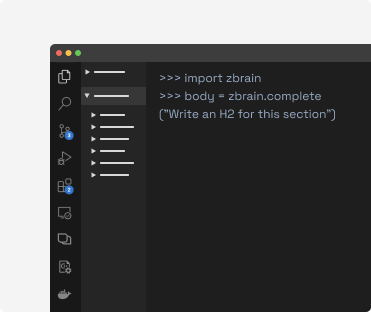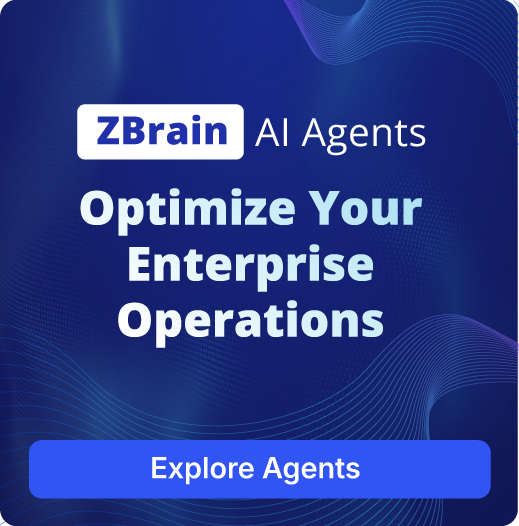How Does ZBrain Benefit Your Financial Business?

Optimized Internal Workflows
From effectively assessing risks to streamlining data analysis and analyzing customer feedback, ZBrain transforms how financial businesses operate. ZBrain empowers your financial institution with highly streamlined and efficient workflows, reducing manual workload and improving accuracy in financial operations.

Improved Decision-making

Customer-facing Systems
Improve customer engagement with ZBrain’s intelligent features. From 24/7 chatbots addressing account inquiries to personalized email campaigns and seamless language translation for global interactions, ZBrain ensures your financial business delivers tailored, context-aware experiences.
Implement ZBrain for Workflow Optimization in Your Finance Enterprise
| Departments / Types of Queries | Generate | Research | Repurpose | Analyze | Transform |
|---|---|---|---|---|---|
| What is the current financial performance of the company? | Explore factors influencing operating costs. | Create engaging presentations using our financial data. | Inspect revenue trends over the last quarter. | Convert financial data into actionable insights. | |
| Generate automated responses for common customer billing inquiries. | Investigate customer challenges related to financial transactions. | Utilize customer support data for process optimization. | Examine response time for financial inquiries in customer support. | Innovate customer feedback into enhanced financial processes. | |
 Risk Management Risk Management |
Generate risk analysis reports based on market trends. | Examine current market risks affecting investment portfolios. | Adapt risk analysis data for compliance reports. | Evaluate risk mitigation strategies and their effectiveness. | Evolve risk analysis into actionable mitigation plans. |
| Summarize legal compliance for financial regulations. | Explore regulatory requirements for financial reporting. | Transform legal compliance information for internal training. | Assess legal proceedings related to financial compliance. | Translate legal compliance data into actionable strategies. | |
| Summarize investment portfolio performance. | Explore potential investment opportunities in the market. | Adapt investment data for diversification strategies. | Evaluate performance of specific investment portfolios. | Translate investment analysis into actionable decisions. | |
| Extract insights for strategic financial decision-making. | Investigate financial insights for strategic decision-making. | Repurpose financial insights for board meeting presentations. | Assess financial goals alignment with overall business objectives. | Convert financial insights into actionable strategic plans. | |
| Extract financial data for employee benefits programs. | Explore budget allocation for employee training and development. | Adapt financial components for HR program communication. | Assess budget allocation for employee training optimization. | Translate financial components into actionable HR initiatives. | |
| Develop cybersecurity measures for financial data protection. | Explore cybersecurity measures for data protection. | Adapt cybersecurity measures for internal documentation. | Evaluate data encryption protocols for financial transactions. | Translate cybersecurity measures into actionable security protocols. |
LLMs That ZBrain Supports
GPT-4.5
Llama 3
GPT NeoX
PaLM-2

Vicuna

FLAN
Gemini-2.0
All Hugging face models
Mistral
AZURE GPT-4
BERT
Stable LM
ZBrain AI Agents for Finance
Discover how ZBrain AI agents bring advanced capabilities to enhance decision-making, streamline operations, and improve customer experiences in finance and banking domains.

Insurance Claims Validation Agent
Automatically validates healthcare insurance claims, checking for missing information, coding errors, or discrepancies before submission.

Regulatory Filing Automation Agent
Automates the preparation of regulatory filings, ensuring accuracy and timely compliance with local and international regulations.

Cash Forecast Verification Agent
Verifies and adjusts cash flow forecasts based on real-time data and unexpected financial events, ensuring accuracy in liquidity planning.

Customer Payment Dispute Resolution Agent
Automatically manages and resolves customer payment disputes, ensuring that discrepancies in invoices or payments are addressed promptly.

Long-term Investment Optimization Agent
Provides recommendations for long-term investment strategies based on market trends, company cash flow, and risk tolerance.

Asset Lifecycle Management Agent
Automates the tracking of company assets, ensuring proper depreciation schedules and providing alerts for asset maintenance or replacement needs.
Integrate ZBrain Into Your Workflows

API

Slack


